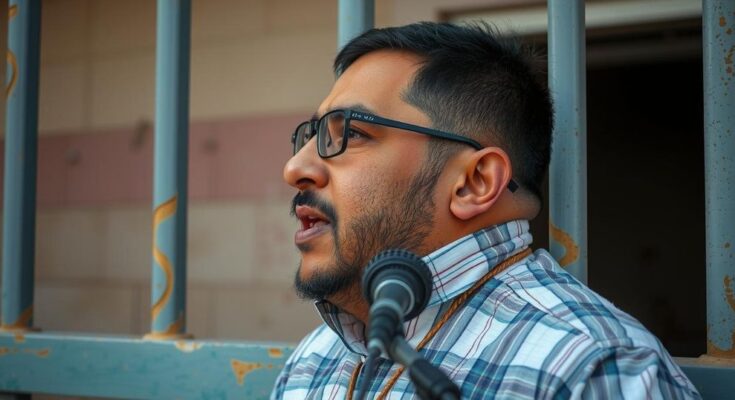Said Ait Mahdi, a Moroccan activist, has been sentenced to three months in prison for leading protests against the government’s response to a devastating earthquake. His charges include defamation and inciting unauthorized demonstrations. Human rights advocates have criticized the sentence as politically motivated, reflecting broader concerns about civil liberties in Morocco amidst the ongoing recovery efforts in the earthquake-affected region.
In a significant legal ruling, Moroccan activist Said Ait Mahdi has been sentenced to three months in prison due to his outspoken protests against the government’s inadequate response to the devastating earthquake that struck the Al Haouz region in September 2023. Ait Mahdi, the president of a prominent activist group, also faces financial penalties exceeding $1,000. His charges stemmed from allegations of defamation, assault, and inciting unauthorized demonstrations, which his legal representative believes were politically motivated and arbitrary in nature, reflecting a mounting concern over human rights in Morocco.
The earthquake, registering a catastrophic magnitude of 6.8, resulted in nearly 3,000 fatalities and widespread destruction across the region, uprooting homes, schools, and infrastructure. Ait Mahdi stands as the first activist from the affected area to receive such a sentence, as public unrest has surged, urging officials to improve recovery efforts and address the dire housing crisis faced by many displacement victims.
Human rights organizations have sharply criticized Ait Mahdi’s sentencing, claiming it serves as retaliation against his advocacy for earthquake survivors. The Moroccan Association for Human Rights described the arrest as arbitrary, pointing to the serious violations faced by the affected populations that the government has failed to address effectively. Following his arrest, a coalition advocating for Ait Mahdi’s release condemned the use of oppressive tactics against individuals championing the rights of marginalized communities.
The recent earthquake intensified longstanding regional disparities, primarily impacting indigenous minority populations who already struggled with underdeveloped infrastructure. Government data indicates that more than 60,000 residences and at least 585 educational institutions sustained damage, prompting Morocco to allocate over $11.5 billion for recovery initiatives over the next five years, aimed at rebuilding and aiding displaced families.
Activist groups have organized protests across various locations, including the capital city, Rabat, where a demonstration highlighted the sluggish reconstruction efforts that have persisted since the disaster. Demonstrators rallied in support of Ait Mahdi, calling him a symbol of hope for the oppressed and the victims of the earthquake, illustrating the increasing unrest and demands for justice among the affected populations.
The ongoing discontent following the September 2023 earthquake in Morocco has highlighted significant issues related to governmental response and social equity. The region struck by the 6.8-magnitude earthquake, Al Haouz, witnessed severe destruction leading to a humanitarian crisis, with thousands of individuals left homeless. In light of this backdrop, the actions and subsequent sentencing of activist Said Ait Mahdi underscore the intensified struggle for civil liberties in Morocco. Activists contend that inadequate recovery measures not only perpetuate inequities but also invite backlash against those who dare to speak out against governmental failures, straining human rights standards across the country.
In summary, the sentencing of Said Ait Mahdi marks a troubling intersection of activism and governmental repression in Morocco. As public protests continue amidst recovery efforts from the devastating earthquake, the case encapsulates broader issues of civil rights and accountability, calling into question the state’s commitment to addressing the needs of its beleaguered citizens. Ait Mahdi’s plight serves as a potent reminder of the challenges faced by those advocating for social justice and human rights in the region.
Original Source: www.wral.com




